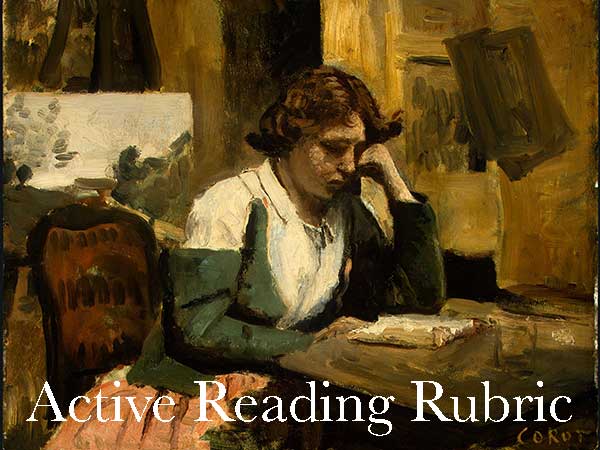
Active Reading Rubric
Downloads
Feel free (and they are free!) to download and use any Crafted Word Rubrics. Simply include a link to TheCrafted Word.org and help us spread the news of our site. Thanks!
-
Download as a pdf.
-
Download an editable document
-
Coming soon…Download an interactive iBook from the iTunes Bookstore!
Join Quip.com
-
Active Reading Full Rubric
- Active Reading Blank Rubric
A Guide for Active Reading
Fitz’s Active Reading Rubric #1
Sometimes we read for simply the pleasure of reading. Sometimes we read because we are studying a piece of literature, and we are trying to understand that literature in a deeper and more profound way. When we read a piece of literature in this way, it is a wise idea to practice what is commonly called “active reading.” In active reading, we notate (by adding notes or highlighting certain parts of the text) so that we come away from the reading with an understanding not only of the plot of the story, but also with a richer vocabulary, an appreciation for how the author uses these words in phrases and sentences for greater effect, and, perhaps most importantly, to discover the important themes that the story uses to make it a great (or sometimes not so great) story.
Five New or Cool Words:
Find five new or cool words in use them in sentences.
Knowing a lot of words is pretty useless unless we actually know how to use and understand those words when reading, speaking, and writing. Reading good books and listening attentively is the number one, all-time best way to develop a rich, broad and diverse vocabulary. (The number two best way is to master the vocabulary flashcards I have created for you)
As you read a story highlight, underline, or circle words you don’t understand—or you just think are words that are really cool and you want to be able to use in your own developing vocabulary. Believe me, there are plenty of cool words out there! In the space below, share five words you found in the reading that you think are awesome, cool, and interesting words. Put the word in bold and then try and use that word in a sentence. You do not need to write the definition.
For Example:
Edifying: I never thought that studying vocabulary would such an edifying experience!
- Word: Use the word in a sentence.
- Word: Use the word in a sentence.
- Word: Use the word in a sentence.
- Word: Use the word in a sentence.
- Word: Use the word in a sentence.
Four Fantastic Phrases
Use four “fantastic phrases” in sentences
Jimmy Hendrix was such an amazing guitarist not because he could play a lot of notes (he certainly could), but because of the way he put those notes together as guitar riffs (a series of notes that create a memorable and enchanting musical phrase). Writers do the same sort of thing by using a short group of words to create an interesting and effective phrase. In the space below, share four phrases that you highlighted in the story that you feel are worthy of remembering. Put the phrase in bold and then create your own sentence.
For Example:
Rosy fingers of dawn: I was tired, but it is worth getting up early to see the rosy fingers of dawn.
- Phrase: Use the phrase in a sentence.
- Phrase: Use the phrase in a sentence.
- Phrase: Use the phrase in a sentence.
- Phrase: Use the phrase in a sentence.
Three Enduring Themes
Identify and show three timeless themes
The themes of any conversation, speech, movie, or book are the ideas, topics, situations and/or points of view used to help tell the story and make it relevant to the listener, viewer or reader. A theme needs to be universal, meaning that people everywhere know and understand what that theme represents in a single word, such as peace, friendship, struggle, loneliness, love, loss, regret, family; moreover, we can understand themes in a more specific way as a short phrase, such as missing a friend (loss), learning to cope with failure (frustration), or appreciating your parents (family).
These universal themes make stories interesting, memorable, and rewarding. Without these universal themes, a story just does not work for us because we need to relate to a story in a personal way in order to like and appreciate that story. Every “good” story has one main theme that is focused on throughout the story (called the main theme or dominant theme) as well as any number of smaller themes (called minor themes) that help to create interesting and often profound parts of the story that we can relate to in any number of emotional and intellectual ways.
For Example: “All Quiet on the Western Front”
The Horror of War: In chapter six, when the attack begins, the soldiers become like maddened machines as they kill each other in the most horrific and brutal ways.
- Theme: Describe how and where this theme is used in the writing piece
- Theme: Describe how and where this theme is used in the writing piece
- Theme: Describe how and where this theme is used in the writing piece
Two Quotable Quotes
Copy and cite two quotable quotes
Having a bunch of good quotes from works of great literature in your memory is like having a lot of useful tools in your toolbox—they’re good to have because you never know when they might come in handy. A good writer spends a lot of time creating sentences that are clear, concise, and memorable, and his or her best sentences are remembered by generations of readers.
A good quote says a lot in a small space. Don’t use a quote that is longer than you are able to memorize; otherwise, you will rarely repeat the quote.
Share two quotes from the writing piece that you feel are worth remembering. It is a good habit to always cite your source for the quote you are using. Use quotation marks and italics for your quote. Cite the source afterwards.
Note: a quote is a passage from the piece of literature you are reading. It does not have to be dialogue.
For Example:
“I went to the woods because I wished to live deliberately, to front only the essential facts of life, and see if I could not learn what it had to teach, and not, when I came to die, discover that I had not lived.” ~Henry David Thoreau, Walden
- “Put quote in italics here” ~Source
- “Put quote in italics here” ~Source
One Thoughtful Response
Share your experience of your reading
If you like something and think it is worth sharing, then it is worth putting in a bit of time and effort to share your thoughts with other people. It is even better when you can have a conversation with other people and share your thoughts and reflection.
There are a couple of ways you can do this.
- To do this, go to The Crafted Word discussion board and post your thoughts, questions, and reflections about the reading. Check back later and see what other people have posted, and then respond to each other in an open, honest, and respectful way. You can respond directly to an individual post or you can add your own post to the discussion thread.
- Write a reflection in your journal or share your thoughts in a podcast.
- Upload the Personal Reading Response Rubric or the Narrative Paragraph Rubric and write a well-crafted and more formal response, and post to your blog.
I have yet to meet a person who regrets the time he or she spent reading great literature. Reading good books is the only investment that really never fails!
©John Fitzsimmons
TheCraftedWord.org
Explore more of The Crafted Word Rubrics
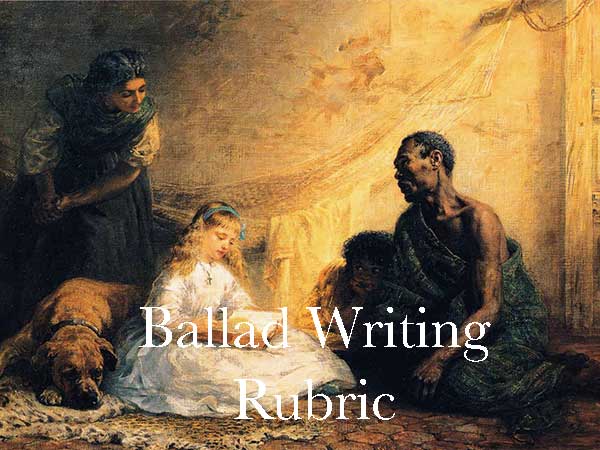
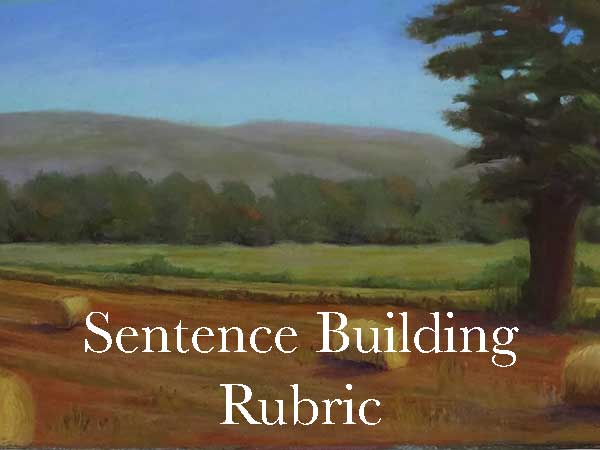

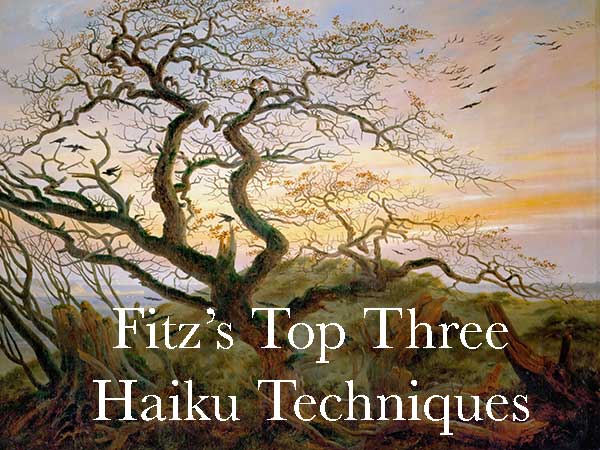
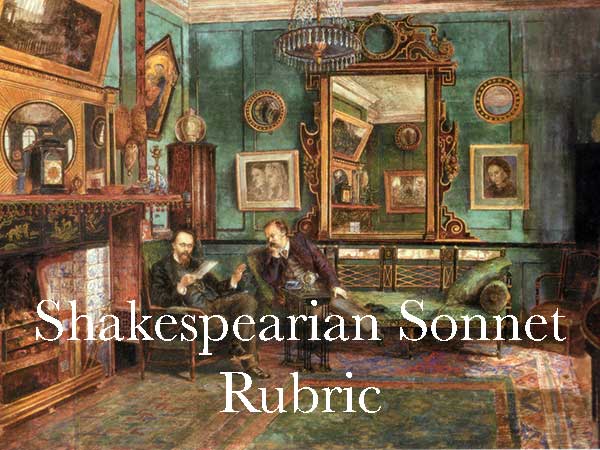
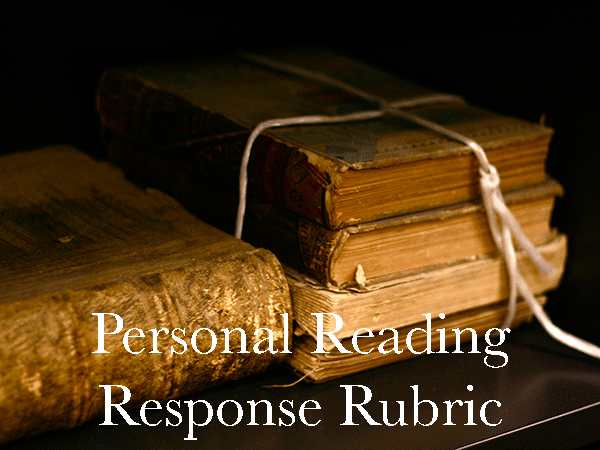
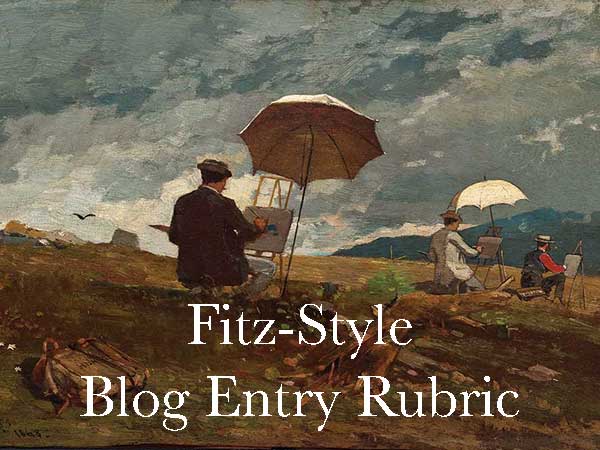
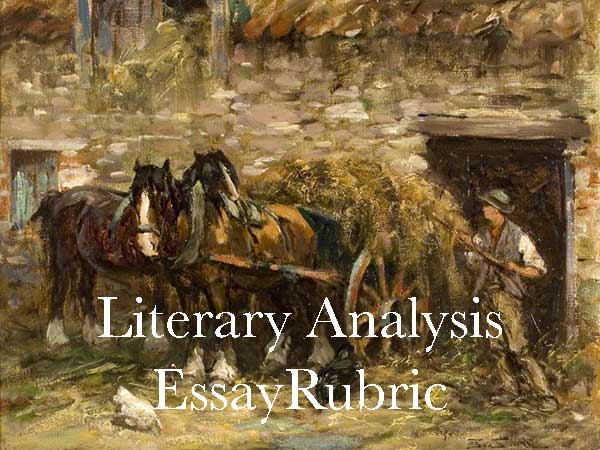
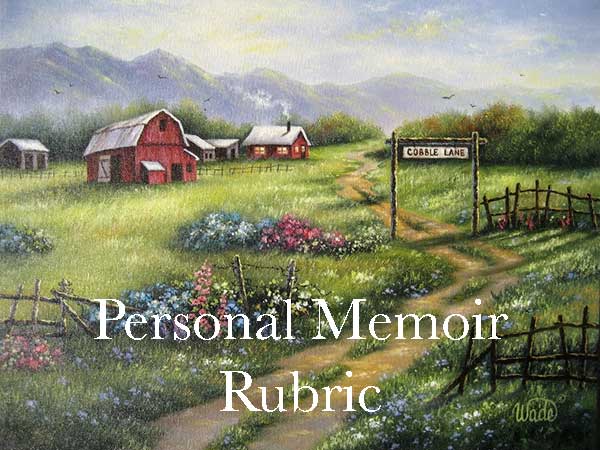
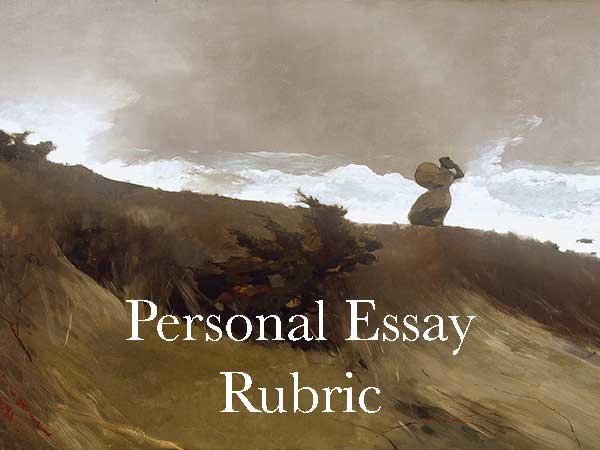
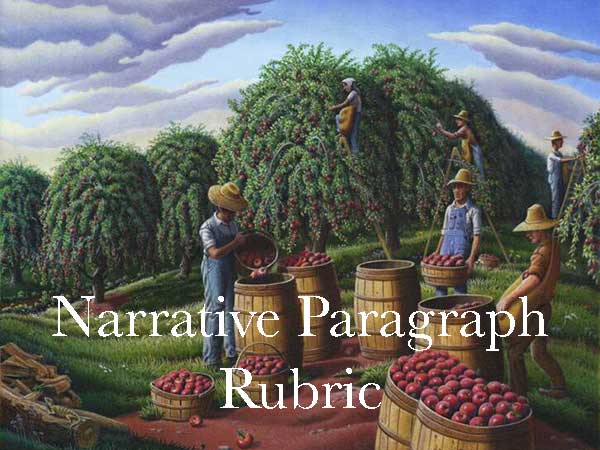
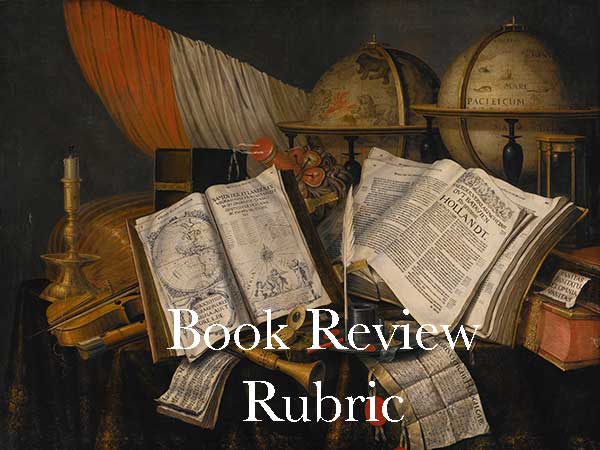
The Heroic Cycle
The hero cycle is not a rubric created for storytellers; it is the primal urge of all people—across ALL cultures—to experience within their own lives the transformation of being a hero. Every ancient culture that has had its history recorded has some epic poem or...
Freshman: A Trip To the River
It seems like somethings is always obscuring view. My eyes try to wrap around the gnarled trunks of swamp maple lining this river. My poor students are somewhere between lost, aggravated and confused. What is the river to them? Perhaps it is just a string of water:...
Fitz-Style Journal Entry
https://youtu.be/yUrdAFKiNmI Upload the Fitz Style Journal Entry Rubric How To Create a Fitz Style Journal Entry Set the Scene & State the Theme; Say what you mean, and finsih it clean When writing a blog post, is important to remember that a reader is also a...